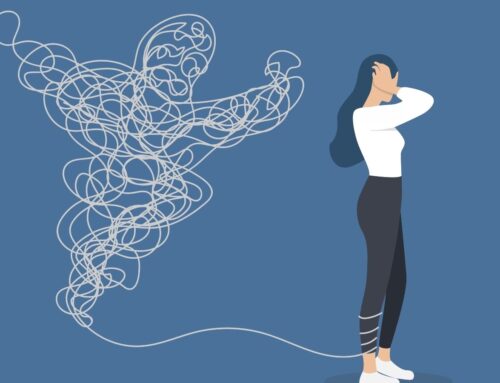Relationships with others are a driving force in so many aspects of our lives. Relationships can help us feel connected, accepted, and loved, all of which are needs that we are biologically wired to crave to thrive in the world. And yet, we may find ourselves in relationships that feel unhealthy, unfulfilling, or even unsafe. Or, we may be in an overall healthy relationship, but worry about how we will maintain that in the long run.
In this blog, we will cover some of the elements that help to foster a healthy relationship as well as some of the signs and behaviors to look out for that indicate a relationship may be unhealthy. Keep in mind that this information can be applied to all types of relationships, not just romantic ones (e.g. friend, parent or other family member, or coworker).
Another important reminder: Everyone may show unhealthy behaviors occasionally, and that doesn’t necessarily mean they are unhealthy as a whole. However, it is important to be aware of those signs and recognize when it’s escalating to abuse. Trust your instincts and seek help if you or someone you know is in danger.
Healthy Indicators:
Respect
At the core of any healthy relationship, there should be respect. This means showing respect for the other person’s values, perspectives, beliefs, and experiences, even when those differ from your own. It includes accepting and valuing someone for who they are, and honoring their boundaries.
Honesty and Trust
Another imperative element to a healthy relationship is trust and honesty. Do you believe that this person has your best intentions? That they would not do anything to intentionally betray, sabotage, or be dishonest with you? Do they mean what they say and demonstrate integrity in both their actions and their words? These are all important questions to ask yourself in your relationships. Additionally, a healthy relationship means that you feel comfortable being open and honest about your feelings without fear of judgment or negative repercussions.
Healthy Conflict
A common misconception about relationships is that if it’s conflict-free, it must be pretty healthy! However, the absence of conflict does not in fact mean that you have a healthy relationship, and instead can be an indication that one or both people are not comfortable expressing their true feelings. But how do we have conflict that’s both healthy and productive? There are several elements that can provide a space for healthy conflict to emerge:
- Stay Open: It’s ok to disagree! What’s important is how you disagree. The goal is to do so with openness and respect for the other person’s perspective. It may vastly differ from your experience, belief, or opinion, but it doesn’t mean either of you is right or wrong. Listen, stay open, and refrain from using judgment.
- Take Accountability: When you have done something to cause another person to feel hurt, angry, dismissed, or uncomfortable, it’s important to take responsibility for your actions and how they impacted that person. This can be challenging when we don’t feel like we did anything wrong, and yet, taking ownership for how our words and actions impact others is a huge bridge towards repair. It requires humility and self-awareness.
- Validate: Validation is not just for therapists! Validating a person’s feelings in your relationships truly goes a long way. Validation helps the other person feel heard and understood, which is generally always going to help de-escalate a heated conflict or prevent it from getting too intense to begin with. It can be as simple as saying “I hear you.”
- Take a Break: Sometimes we are not immediately ready to talk something through, especially right after we’ve been emotionally activated. Part of having healthy conflict is recognizing when you are both ready, and not ready, to have a conversation. Rather than immediately reacting off your emotions, it’s ok (and encouraged) to take a break and cool off when you are feeling too heated. This could mean taking a 5 or 10 minute break to go on a walk or do some deep breathing, or even taking the day before you come back together. When we give our nervous systems a chance to regulate, there is greater likelihood for a more productive and thoughtful conversation to take place.
Regular Communication
Not only is it important to have open communication during conflict, but also as a general practice in your relationship. Communication should not just happen in reaction to an issue, but preventatively as a way to get ahead of potential problems down the road. Regular communication also fosters opportunities for deeper connection and emotional intimacy. This may include sharing about your fears, goals, desires, and worries, to express curiosity about something, and to communicate about plans and logistics. The key here, in addition to everything described above, is for this communication to be part of your regular routine. When we don’t talk about what’s on our mind, it can lead to resentment, unmet expectations, and disconnection. Carving out consistent and meaningful time to share with your partner (or other relationship) helps to deepen and maintain your connection and partnership.
Empathy
Empathy is a powerful tool for connection in our relationships. It reduces people’s feelings of shame and allows them to feel heard and seen without judgment. When we show empathy, it doesn’t mean we have to have had the same experience as the other person, but rather that we connect to the feeling underneath the experience. Empathy is not about fixing anything; it’s simply about being present with that person in the emotions and feelings they’re experiencing. When we lead with empathy, we are also more equipped to consider and understand how our needs may be different than the needs of the other person, and can then respond appropriately.
Unhealthy Indicators:
Gaslighting and Manipulation:
While the term gaslighting has become a buzzword over the years, there is true merit to what it means and how it impacts those on the receiving end. Gaslighting is a form of psychological manipulation where someone, often in a position of power over another, seeks to create doubt in someone, causing them to question their own memory, perception, or sanity. For example, you are repeatedly told you are “crazy”, “overreacting”, or “too sensitive” when the other person is belittling you. Or, they intentionally change or deny the facts of something that already occurred, causing you to doubt your memory.
Someone may be manipulated in other ways as well, such as by having their emotions or experiences used against them in an effort by the other person to gain control. This could look like sharing something vulnerable with your partner that you didn’t want anyone to know, and then they later threaten to share that information if you don’t comply with their request.
All forms of gaslighting and other manipulation tactics can have a serious impact on someone’s mental and emotional well-being, often leading that person to feel isolated, confused, anxious, or depressed. It’s important to be aware of these behaviors, particularly if you are noticing that it is a pattern.
Possessiveness and Jealousy
We may all feel jealous at certain times. It becomes unhealthy when those feelings of jealousy lead to trying to control someone else’s behavior, such as who they spend their time with. Someone exhibiting possessiveness may expect access to your devices or social media accounts, ask incessant questions about who you’re hanging out with when not with them, and try to limit who you can see or talk to. This can quickly escalate to the other person being isolated from their loved ones, which is a major sign of an abusive relationship.
Deflecting Responsibility
When someone is repeatedly unable to take responsibility for their actions and mistakes, it becomes difficult to work through conflict. This typically involves someone making excuses or justifications for their behavior or being unwilling to acknowledge their role in the conflict. This also includes denying the impact that their actions had on the other person, such as by saying “I’m sorry you feel that way”. You know, that “apology” that is really NOT an apology (we’ve all heard it before, and maybe even said it!).
Dishonesty
No one enjoys being lied to. While honesty provides a strong foundation for a relationship, dishonesty can quickly put cracks in that foundation. Although relationships can bounce back from an episode of dishonesty, if it starts to become a pattern, you should be on high alert. Someone may start out by lying about small things, which often indicates that they will lie and hide other more significant aspects of their lives down the road. Being aware of this pattern is crucial in determining if they are someone you can really trust, both with what you share with them and in what they share with you.
Devaluing
Any kind of name calling, put downs, or other tactics to degrade someone’s character and self-worth are all ways to devalue someone. For example, someone that makes harsh comments about your weight, is regularly critical of you, or calls you unkind names, are all forms of devaluing and belittling. This could happen directly to someone’s face or could also be happening behind the other person’s back in how they speak about you to others. Both are red flags. It’s important to pay attention to these patterns, as they can quickly degrade a person’s self-esteem and sense of emotional safety.
There’s a reason that people say relationships take work; it’s because they do! A healthy relationship must be tended to regularly to ensure that it grows and that the areas that need attention are nurtured. It also requires having awareness of the signs and behaviors that you or the other person may be engaging in that could be unhealthy. But it’s so worth it! Your relationships will be more fulfilling in both the short and long term when you put in the time and effort to care for them. And, you don’t have to do it alone! If you need support in your relationships, reach out to one of our clinicians at Georgetown Psychology. Additionally, seek help if you or someone you know is in an unsafe situation. I have included some resources below.
Resources:
National Domestic Violence Hotline:1-800-799-SAFE (7233) https://www.thehotline.org/
One Love Foundation: https://www.joinonelove.org/
Suicide and Crisis Lifeline: 988, https://988lifeline.org/
References
Brown, B. (2007). I thought it was just me (but it isn’t): Making the journey from “What
will people think?” to “I am enough.” Penguin Random House.
One love. (2024, June 18). The 10 signs. https://www.joinonelove.org/relationships/






